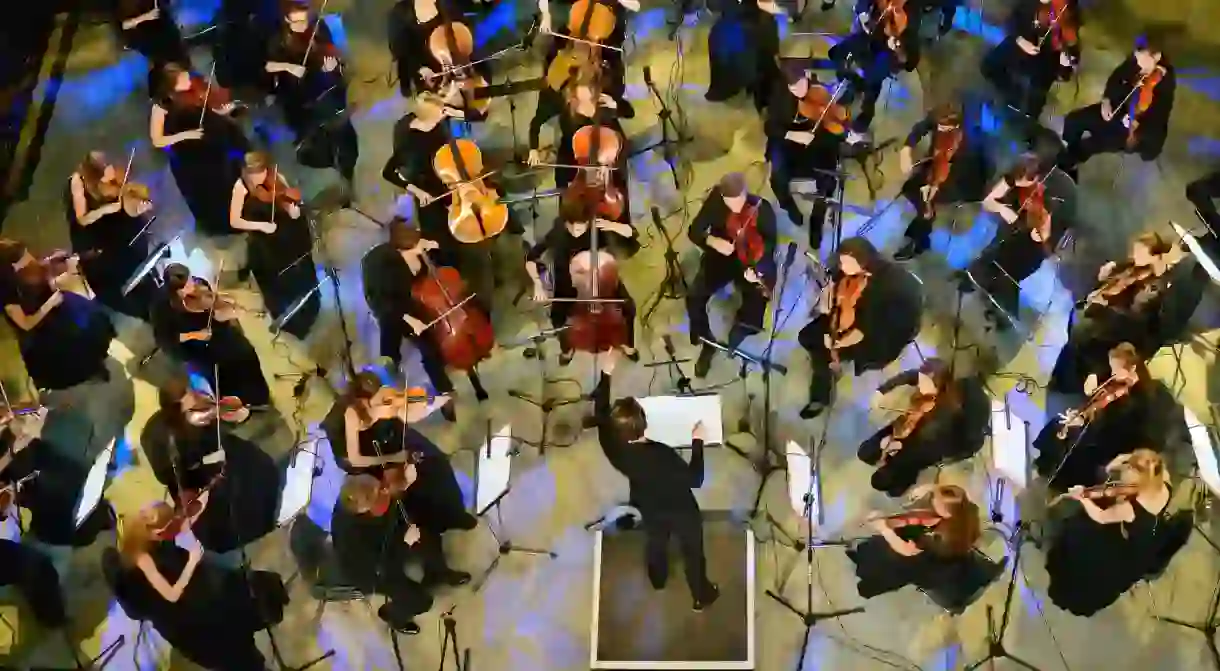Baltic Sea Philharmonic: The Ultimate Reason For An Orchestra To Exist

‘There should be a reason for having an orchestra – not just to play music,’ says Kristjan Järvi, internationally successful conductor and co-founder of the Baltic Sea Philharmonic. It’s an orchestra that wants to bring not only beautiful music, but peace to a politically divided Baltic region, raise awareness of nature and create a platform for unity, change and innovation.
The origins of this orchestra lay in the Baltic Sea Youth Orchestra, which was founded in 2008. The cornerstone has always been a comprehensive musical education, which led to the creation of the Baltic Sea Music Education Foundation. This foundation holds an academy offering intense workshops, seminars and coachings for not only young orchestra musicians but also conductors and composers. What makes this foundation stand out from others is their rootedly different approach to classical music, away from perfectionism and focus on technique towards a musical unity. All their efforts earned them the European Cultural Prize of the European Foundation for Culture ‘Pro Europe’ in 2015. In April 2016, a fully professional orchestra was founded as the logical continuation of their work – the Baltic Sea Philharmonic. Chief conductor and music director Kristjan Järvi explains, ‘Music is not about right or wrong. When I rehearse with the orchestra I mostly let them play. I do not care about right or wrong notes, but what I teach them is to phrase and create a bigger picture.’

Kristjan Järvi explains further about this way of making music: ‘We are going beyond any expectation of what an orchestra should be. There should be a reason to have an orchestra. Not only music but a bigger purpose. When I started to work with these wonderful young musicians I taught them first of all how to breathe together, how to think as one, how to feel each other and how to phrase together. Only then have we created a unity and a mutual understanding of each and every one of us. And this is what then spreads to the audience and further into society.’ A wonderfully peaceful approach and really, the instant the orchestra plays its first notes it becomes evident that they work extremely well together. Every transition, every change in tempo or phrasing is synced. Just as if they had been playing together for all their lives and not just since April this year. ‘When we play, Kristjan’s energy is incredible. What he is able to bring out in each and every one of us is just amazing. We musicians have to be extremely watchful and attentive when he is conducting; you cannot rely on anything we rehearsed, but this creates a marvelous flow and I can barely sit still when playing,’ says one of the viola players.

The Baltic Sea Philharmonic brings together musicians from all ten countries surrounding the Baltic Sea (Sweden, Norway, Germany, Estonia, Lithuania, Finland, Russia, Latvia, Poland and Denmark). The orchestra recently rounded off their Baltic Sea Discovery Tour, playing concerts in Gdansk, Kaliningrad, Klaipeda and other cities at the shore of the Baltic Sea. Every concert they have played so far has been so full of energy and positive vibes that it earned them standing ovations. The orchestra also released its first CD, Wagner / The Ring in early September 2016.
Next to the orchestra’s educational mission stands their commitment to the environment. Several pieces in their repertoire have nature as their core theme, such as the Swansong by Arvo Pärt, Tschaikovsky’s famous Swan Lake in a new arrangement by Kristjan Järvi, or Never Ignore the Cosmic Ocean by Gediminas Gelgotas. ‘Environment is a very important word for us, in two different senses,’ the music director states in an interview. ‘As humans we create the environment between each other. But we also have to be connected to the greater environment in our daily lives. Then we realize that there are no differences between people or nationalities. The whole planet is ours. It doesn’t matter where you come from or what your story is: we must take care of each other, and of the Earth. Nature does not need us. Humans have become a parasite to Earth but it is us humans who have made us into that and it is us humans who can change that.’
The motto of the orchestra is to go ‘beyond borders, beyond culture, beyond countries and beyond music’. Gidon Kremer, internationally renowned violinist from Latvia and soloist playing with the orchestra says about the project, ‘I hope for discovery – not just on land and in concerts halls, but also in learning and experiencing unknown music together, and growing with it. Young people carry the responsibility for our future, and this also relates to music. Sure, we may not change the world, but we can still have a positive impact on those people who attend our concerts. It is possible to fight many prejudices.’ What better way to fight prejudices than with the most beautiful weapon in the world – music.
To find out more about this orchestra check out their website, facebook and YouTube.













